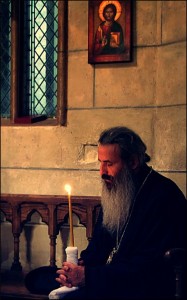
As I mentioned in Friday’s Week in Review, my InterVarsity colleague Tom Trevethan pointed me to a recent post by Fuller president Richard J. Mouw on Duke’s Call & Response blog.
Mouw asks:
What difference does it make to open class with prayer?
In Following Christ 2008’s Humanities track, Classics scholar Dora Rice Hawthorne, who was then at Baylor, shared a paper reflecting on Anselm’s practice of not merely opening his classes with prayer, but even stopping in the middle of his lectures to offer up prayers giving thanks for the subject matter, asking for the Spirit’s guidance in understanding Biblical texts, and so on. She remarked that, even at a Christian school like Baylor, stopping in the middle of class to pray about the subject matter seemed like a gross violation of academic propriety.
Mouw, borrowing from Mark Schwehn’s excellent Exiles from Eden: Religion and the Academic Vocation in America, wonders if there is something misguided with our common reluctance to pray in class:
The Western academy emerged out of worshipping communities, after all. And, as Schwehn boldly states his case, “the continued vitality [of academic life today] would seem to be in some jeopardy under wholly secular auspices.” Schwehn suggests much of the academy today is “living off a kind of borrowed fund of moral capital.” For example, to the degree that the virtues that are crucial for a sense of communal academic trust are still present in the broader academy, they are drawing on resources from past spiritual practices that are no longer seen as necessary to the intellectual quest.
Mouw’s blog post deals primarily with Christian universities, but Tom Trevethan wanted to begin a conversation about how faculty and students integrate prayer in their academic work at secular universities.
What are your thoughts about Mouw’s blog post? Do you include prayer as part of your academic work? If you’re at a public or secular private university, how do you define the boundaries between your private/public prayer life and the secular/pluralistic environment of the university?
Photo credit: iulian nistea via Flickr
The former Associate Director for the Emerging Scholars Network, Micheal lives in Cincinnati with his wife and three children and works as a web manager for a national storage and organization company. He writes about work, vocation, and finding meaning in what you do at No Small Actors.

Hmm . . . I guess I’ll break the silence about the secular university. I like to pray before I go to class, and I like to frame my day using a morning and evening prayer liturgy (I use a modified/expanded version of the Roman Catholic Liturgy of the Hours). When I feel particularly challenged or elated, I’ll even recite a psalm before going to class. At a trying time, I’ll even pray silently in class before responding to the situation.
But what I miss is having people to pray with. That is one reason why I like the practice of morning and evening prayer–the awareness that throughout the world there are others following that same practice and, in a sense, praying with me.
Thanks for sharing, Kevin. That’s a great point about praying the Hours as a way of participating in a community, even if the community isn’t physically gathered.